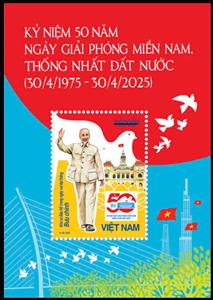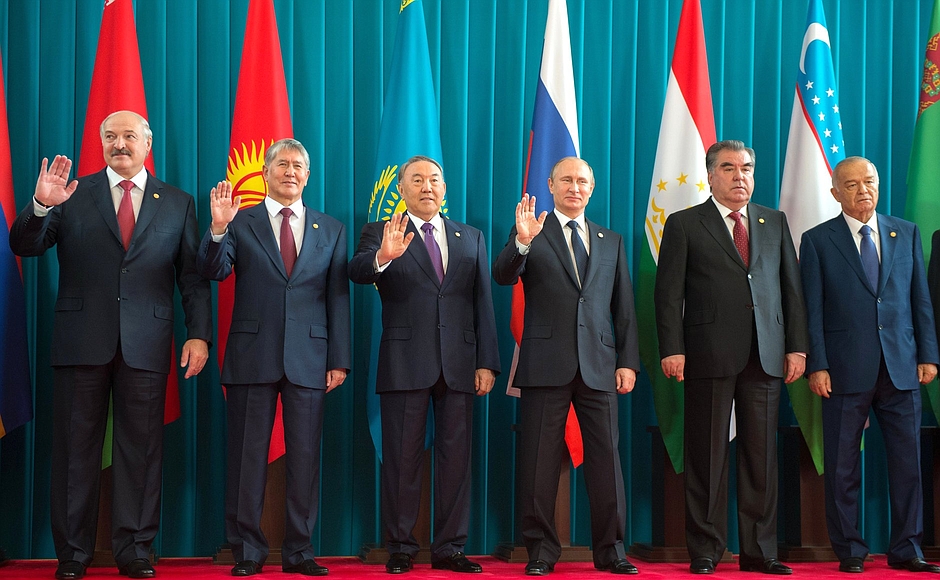Souvenir Sheet: Hồ Chí Minh (1890-1969) and Hồ Chí Minh City Hall (Vietnam 2025)
Hồ Chí Minh (1890-1969) and Hồ Chí Minh City Hall (Vietnam 2025)
27 April (Vietnam ) within release Liberation of Southern Vietnam, 50 Years (2025) goes into circulation Souvenir Sheet Hồ Chí Minh (1890-1969) and Hồ Chí Minh City Hall face value 15,000 Vietnamese đồng
| Souvenir Sheet Hồ Chí Minh (1890-1969) and Hồ Chí Minh City Hall in catalogues | |
|---|---|
| Colnect codes: | Col: VN 2025.04.27-03 |
Souvenir Sheet is vertical format.
Also in the issue Liberation of Southern Vietnam, 50 Years (2025):
- Stamp - Children with Vietnamese and Viet Cong Flags face value 15,000;
- Souvenir Sheet - Hồ Chí Minh (1890-1969) and Hồ Chí Minh City Hall face value 15,000;
- Stamp - Hồ Chí Minh (1890-1969) and Hồ Chí Minh City Hall face value 15,000;
- Stamp - Soldier and Raising of Flag over Independence Palace, Saigon face value 4,000;
Souvenir Sheet Hồ Chí Minh (1890-1969) and Hồ Chí Minh City Hall it reflects the thematic directions:
An anniversary is the date on which an event took place or an institution was founded in a previous year, and may also refer to the commemoration or celebration of that event. For example, the first event is the initial occurrence or, if planned, the inaugural of the event. One year later would be the first anniversary of that event. The word was first used for Catholic feasts to commemorate saints. Most countries celebrate national anniversaries, typically called national days. These could be the date of independence of the nation or the adoption of a new constitution or form of government. The important dates in a sitting monarch's reign may also be commemorated, an event often referred to as a "Jubilee".
A bridge is a structure built to span physical obstacles without closing the way underneath such as a body of water, valley, or road, for the purpose of providing passage over the obstacle. There are many different designs that each serve a particular purpose and apply to different situations. Designs of bridges vary depending on the function of the bridge, the nature of the terrain where the bridge is constructed and anchored, the material used to make it, and the funds available to build it.
A building or edifice is a structure with a roof and walls standing more or less permanently in one place, such as a house or factory. Buildings come in a variety of sizes, shapes and functions, and have been adapted throughout history for a wide number of factors, from building materials available, to weather conditions, to land prices, ground conditions, specific uses and aesthetic reasons. Buildings serve several needs of society – primarily as shelter from weather, security, living space, privacy, to store belongings, and to comfortably live and work. A building as a shelter represents a physical division of the human habitat (a place of comfort and safety) and the outside (a place that at times may be harsh and harmful).
The City Halls are part of a market complex designed by John Carrick in 1882, but the grand hall itself was designed by George Murray and opened in 1841. It was the first hall suitable for large gatherings and concerts to be built in the City and played host to the likes of Benjamin Disraeli, Charles Dickens, Hungarian patriot Lajos Kossuth and William Ewart Gladstone. From its early days it hosted a wide variety of popular and classical concerts including those by touring groups such as Louis-Antoine Jullien's celebrated London-based orchestra and Charles Halle's orchestra from Manchester. Glasgow's first regular orchestral subscription concert series, played by an orchestra managed by the Glasgow Choral Union, was given in the grand hall from 1874 until the opening of the much larger St Andrew's Hall in 1877. Arthur Sullivan was its conductor for two seasons from 1875 to 1877. The Old Fruitmarket directly adjoins the grand hall and was a functioning market until the 1970s after which it was in occasional use for jazz and folk music events. The adjoining buildings were home to bustling produce markets such as the fresh fruit and flower market and the cheese market.
A head of state (or chief of state) is the public persona that officially represents the national unity and legitimacy of a sovereign state. In some countries, the head of state is a ceremonial figurehead with limited or no executive power, while in others, the head of state is also the head of government. In countries with parliamentary governments, the head of state is typically a ceremonial figurehead that does not actually guide day-to-day government activities and may not be empowered to exercise any kind of secular political authority (e.g., Queen Elizabeth II as Head of the Commonwealth). In countries where the head of state is also the head of government, the president serves as both a public figurehead and the actual highest ranking political leader who oversees the executive branch (e.g., the President of the United States).





